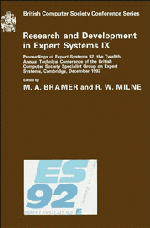Book contents
- Frontmatter
- Contents
- Preface
- Introduction
- CONSULTANT: providing advice for the machine learning toolbox
- A methods model for the integration of KBS and conventional information technology
- KBS methodology as a framework for co-operative working
- Project management for the evolutionary development of expert systems
- The specification and development of rule-based expert systems
- Towards a method for multi-agent system design
- Jigsaw: configuring knowledge acquisition tools
- On the relationship between repertory grid and term subsumption knowledge structures: theory practice tools
- Strategy maze: an on-line tool for support management of the knowledge acquisition process
- Concurrent engineering using collaborating truth maintenance systems
- Ockham's razor as a gardening tool
- A designer's consultant
- Fairness of attribute selection in probabilistic induction
- An application of case-based expert system technology to dynamic job-shop scheduling
- Neural network design via LP
- KEshell2: an intelligent learning data base system
- Approaches to self-explanation and system visibility in the context of application tasks
- An object oriented approach to distributed problem solving
- Intelligent user interface for multiple application systems
- Combining qualitative and quantitative information for temporal reasoning
- Documents as expert systems
On the relationship between repertory grid and term subsumption knowledge structures: theory practice tools
Published online by Cambridge University Press: 04 August 2010
- Frontmatter
- Contents
- Preface
- Introduction
- CONSULTANT: providing advice for the machine learning toolbox
- A methods model for the integration of KBS and conventional information technology
- KBS methodology as a framework for co-operative working
- Project management for the evolutionary development of expert systems
- The specification and development of rule-based expert systems
- Towards a method for multi-agent system design
- Jigsaw: configuring knowledge acquisition tools
- On the relationship between repertory grid and term subsumption knowledge structures: theory practice tools
- Strategy maze: an on-line tool for support management of the knowledge acquisition process
- Concurrent engineering using collaborating truth maintenance systems
- Ockham's razor as a gardening tool
- A designer's consultant
- Fairness of attribute selection in probabilistic induction
- An application of case-based expert system technology to dynamic job-shop scheduling
- Neural network design via LP
- KEshell2: an intelligent learning data base system
- Approaches to self-explanation and system visibility in the context of application tasks
- An object oriented approach to distributed problem solving
- Intelligent user interface for multiple application systems
- Combining qualitative and quantitative information for temporal reasoning
- Documents as expert systems
Summary
A number of practical knowledge acquisition methodologies and tools have been based on the elicitation and analysis of repertory grids. These result in frames and rules that are exported to knowledge-based system shells. In the development of repertory grid tools, the original methodology has been greatly extended to encompass the data types required in knowledge-based systems. However, this has been done on a fairly pragmatic basis, and it has not been clear how the resultant knowledge acquisition systems relate to psychological, or computational, theories of knowledge representation. This paper shows that there is a close correspondence between the intensional logics of knowledge, belief and action developed in the personal construct psychology underlying repertory grids, and the intensional logics for term subsumption knowledge representation underlying KL-ONE-like systems. The paper gives an overview of personal construct psychology and its expression as an intensional logic describing the cognitive processes of anticipatory agents, and uses this to survey knowledge acquisition tools deriving from personal construct psychology.
PERSONAL CONSTRUCT PSYCHOLOGY
George Kelly was a clinical psychologist who lived between 1905 and 1967, published a two volume work (Kelly, 1955) defining personal construct psychology in 1955, and went on to publish a large number of papers further developing the theory many of which have been issued in collected form (Maher, 1969). Kelly was a keen geometer with experience in navigation and an interest in multi-dimensional geometry.
- Type
- Chapter
- Information
- Research and Development in Expert Systems IX , pp. 125 - 144Publisher: Cambridge University PressPrint publication year: 1993
- 2
- Cited by

